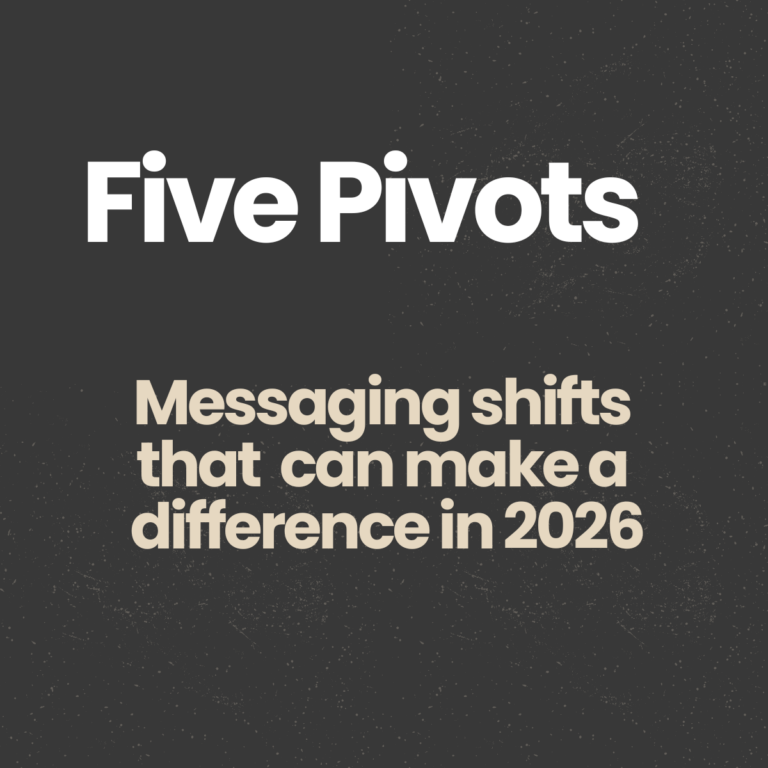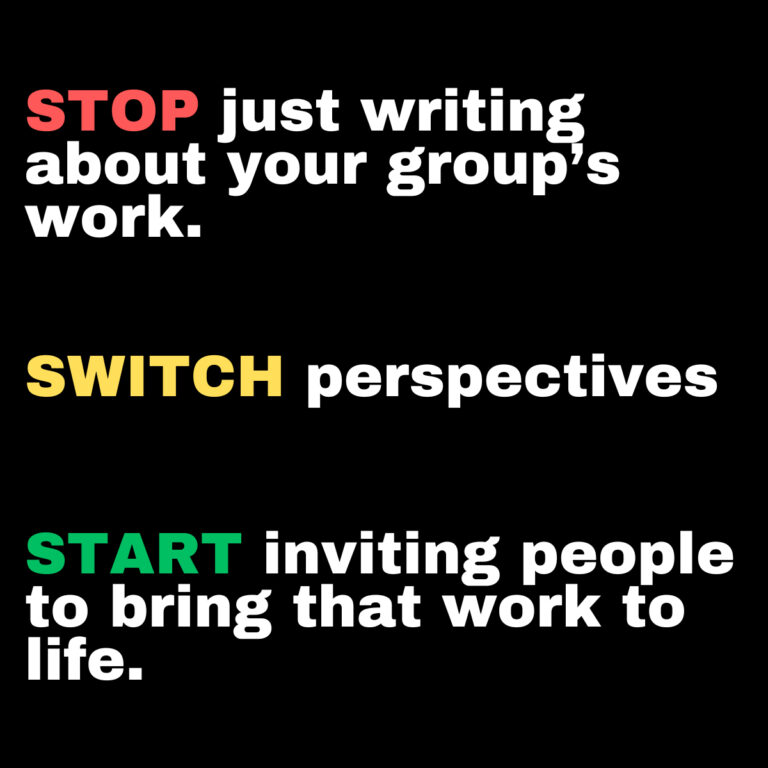As I write this, nonprofit communicators across the nation are facing an unenviable task. They are planning and drafting their post-election/year-end messages without the answer to a central question.
Come the first Wednesday in November, will we be embracing the hope and energy of a Kamala Harris presidency or bracing for another four years of Donald Trump?
This memo outlines key messaging dynamics that must be taken into account in each scenario.


Your copy will have to reflect the emotional weight of a Harris win. If President Biden stayed in the race and won, it would have provoked a major sigh of relief. Still it would have felt more like dodging a bullet than some kind of transformational turning point in our politics. For a lot of reasons, a Harris victory will feel quite different.
Post-election, the historic nature of her candidacy (which her campaign is rightly downplaying now) will come into clear, celebratory focus. And, in perhaps an inflated fashion, the success of Harris’ bold, joyful “turn the page” campaign will raise peoples’ expectations and sense of possibility.

The worst thing you can do amid the initial euphoria of a Harris win is adopt a “now we return to our regular programming” tone in your messaging. With Trump out and Harris in, we will have entered a new political landscape. And a new era calls for new language and perspectives. I’m not arguing that you should throw out your core narrative or your brand identity. I’m just saying you will miss the mark if you convey a ho hum “the election’s over and now we’re back to our regular routine” message.

Of course, the counterweight to seeing a Harris win as the dawning of a new era is the reality that, despite the election results, we are still a deeply divided nation. That will be reflected in the relatively narrow margin of Kamala Harris’ victory. (If she were to win in more dramatic fashion, that would upend our politics in a deeper way.)
Trump may be finished, but Trumpism and the MAGA movement will still have to be contended with – in Congress, in state legislatures, and in the same kind of determined resistance that Obama encountered. Progressives will need to gear up to overcome MAGA-style efforts to upend the incoming Harris administration’s initiatives. That’s a powerful argument for ongoing donor and activist engagement in your work.
NOTE: Win or lose in November, Democrats in general and progressives specifically must make a concerted effort to better understand and connect with Trump voters. I’m not talking about the core MAGA crazies. I mean the far more numerous cohort of good-hearted, disaffected people who justifiably feel that the deck is stacked against them and that our politics neither understands their lives nor addresses their needs. I will have more to say about this essential project in the weeks ahead.

Timing is everything. The new administration – and the new political coalition Kamala Harris is forging – will either be strengthened by a strong start or weakened by high-profile, early setbacks. If you make that argument explicitly, your supporters will understand the need for some quick wins in early 2025.
Emphasize the need to seize the moment and to see the electoral victory as just opening the door to genuine achievement. That will counter the understandable human instinct for people to “take a break” from political engagement after throwing themselves heart and soul into the election.

The more specific you are in explaining to your supporters what a fast start in early 2025 will look like, the more compelling your post-election messages will be. A detailed call to action will bring your messaging to life.
But, just as important, a specific message around the issue or issues your organization focuses on will separate your content from the plethora of generic, post-election “let’s hit the ground running” messages that will be out there.


I have vivid memories of November 2016. Working with groups like the ACLU and Planned Parenthood, I saw and helped shape the amazing outpouring of grassroots support for organizations people felt they could count on to resist Trump’s assault on our fundamental freedoms. People came forward in numbers substantial enough to transform those organizations in fundamental ways and to fuel a powerful, sustained resistance.
If Trump wins this time, will it happen again?
It’s an open question. My worry isn’t so much that people will feel as if everything is lost. It’s that they decide they can’t take the personal, emotional toll this time around.
What was unique about the amazing reaction to the threats of the first Trump presidency wasn’t just the size of the initial response. It was the sustained nature of that response. Over time, many donors and activists found it personally challenging to keep resisting. In focus groups, they reported taking “mental health breaks” and using temporary media blackouts to make it through.
But despite all that, people hung in there all through his presidency, doing the best they could to protect the people and principles under attack. In the event of a Trump victory in 2024, we will face two questions.
- Can we get people to rush to the ramparts again?
- Can we get them to stay there over time?
Here are five keys to getting to “yes” on both of these questions.

If Harris loses to Trump, it’s going to hurt big time. First of all, Democrats, along with progressive nonprofits and media outlets, have spent the better part of two years warning that a Trump win will create an existential threat to democracy. And the joyful way Harris is running her campaign – the clear picture of a more promising future she is creating – will make a loss hurt even more deeply.
No honest post-election message can be conveyed without acknowledging how painful and alarming four more years of Trump will be. Before you can take your message anywhere else, you have to call out and validate that pain.

It’s one thing to acknowledge peoples’ pain about the most alarming presidential campaign result in American history. It’s another thing to simply wallow in fear and despair alongside your donors and supporters. At moments of high anxiety, people rely on the groups they support to lead with confidence and to have a plan of action they can embrace even in the darkest of moments.
So don’t sugarcoat the dire consequences of a Trump victory. But call them out and then quickly show people you remain undaunted. Show them how to move forward – concrete steps they can take to protect the people and principles they care about.

Did your organization successfully mobilize existing and new supporters in the aftermath of Donald Trump’s victory over Hillary Clinton? If so, resist the temptation to simply pull out and dust off your old playbook.
Sure, pay attention to organizing and fundraising techniques that worked before. But don’t ask people to simply suck it up and fasten their seatbelts for another four years. That’s a dispiriting call to action. Make new plans. Tell people about new approaches, lessons you’ve learned through trial and error, new strategies and tactics that Trump and his MAGA allies won’t see coming.

If he wins, the forthcoming Trump presidency will be the elephant in the room. Don’t make it the only thing in the room. If you have promising state-level initiatives or international projects less susceptible to Trump’s influence, emphasize them.
Don’t do it in replacement of Trump resistance work. That will make it look like you have your head in the sand. But call out that more promising, out of Trump’s reach work alongside directly confronting his impact on your issue.

One of the most persuasive ways to encourage people not to turn away is to call out the fact that those most immediately and directly in Trump’s line of fire don’t have that option. We have to keep fighting. Why? Because to not do so is to abandon people whose lives will be turned upside down by Trump if we don’t stand in his way.

People participate in your group’s work to express and reinforce their personal identity. They strive to act in ways that make them proud of who they are and that demonstrate how faithfully they act on their beliefs.
In challenging times like the advent of a dreaded Trump second term, leaning into direct appeals to your current and potential supporters’ personal identity may be one of the best ways to override their sense of despair or frustration.

In 2017, one of the factors that “locked in” peoples’ willingness to keep resisting Trump’s outrages was initial success such as the ACLU’s early win challenging Trump’s Muslim ban. It’s not an easy task. But if you can seek out even small wins in the early weeks of 2025, that will obviously have a powerful reinforcing impact on peoples’ decisions to stay engaged.

I hope you will find these thoughts helpful as you plan and execute your post-election messaging. I am aware that I have left out one other post-election scenario – the possibility of an unclear outcome on November 5th or a clear one that still faces Trump-driven efforts to overturn it. I will address that possibility as we get closer to Election Day.










Thank you for pointing out that a Harris win will not eliminate the MAGA movement. However much I hope it DOES happen, I think that is an important thing to keep in mind as organizers will face newer challenges that will need creative solutions.